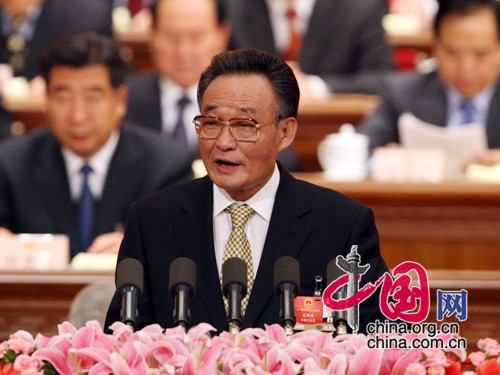|

|
|
Chinese top legislator Wu Bangguo is delivering a work report of the Standing Committee of the National People's Congress (NPC), or the top legislative body, at the second session of the 11th NPC Monday morning. |
Top Chinese legislator Wu Bangguo on Monday called on the country's lawmakers to maintain the correct political orientation, stressing the "essential differences" between the system of China's people's congresses and Western capitalist countries' system of political power.
Maintaining the correct political orientation is essential to the success of the work of the people's congresses, said Wu, chairman of the Standing Committee of the National People's Congress (NPC), when delivering a work report of the committee at the annual NPC session.
The most fundamental aspect in maintaining the correct political orientation is to "organically integrate the leadership of the Party, the position of the people as the masters of the country and the rule of law," Wu noted, adding "the core" is to uphold the leadership of the Party.
"We must more fully recognize the essential differences between the system of people's congresses and Western capitalist countries' system of political power," Wu said.
"China's system of political parties is a system of multiparty cooperation and political consultation under the leadership of the Communist Party of China (CPC), not a Western-style multiparty system," he said.
The system of the people's congresses is not a Western system with the separation of the three powers, Wu said.
Deputies to the people's congresses are broadly representative and they do not represent a single party or group as members of Western parliaments do. They exercise their lawful duties and powers collectively at meetings, rather than each deputy addressing problems directly and separately from other deputies, Wu added.
China must draw on the achievements of all cultures, including their political achievements, but shall "never simply copy the system of Western countries or introduce a system of multiple parties holding office in rotation, a system with the separation of the three powers or a bicameral system," Wu said.
(Xinhua News Agency March 9, 2009)